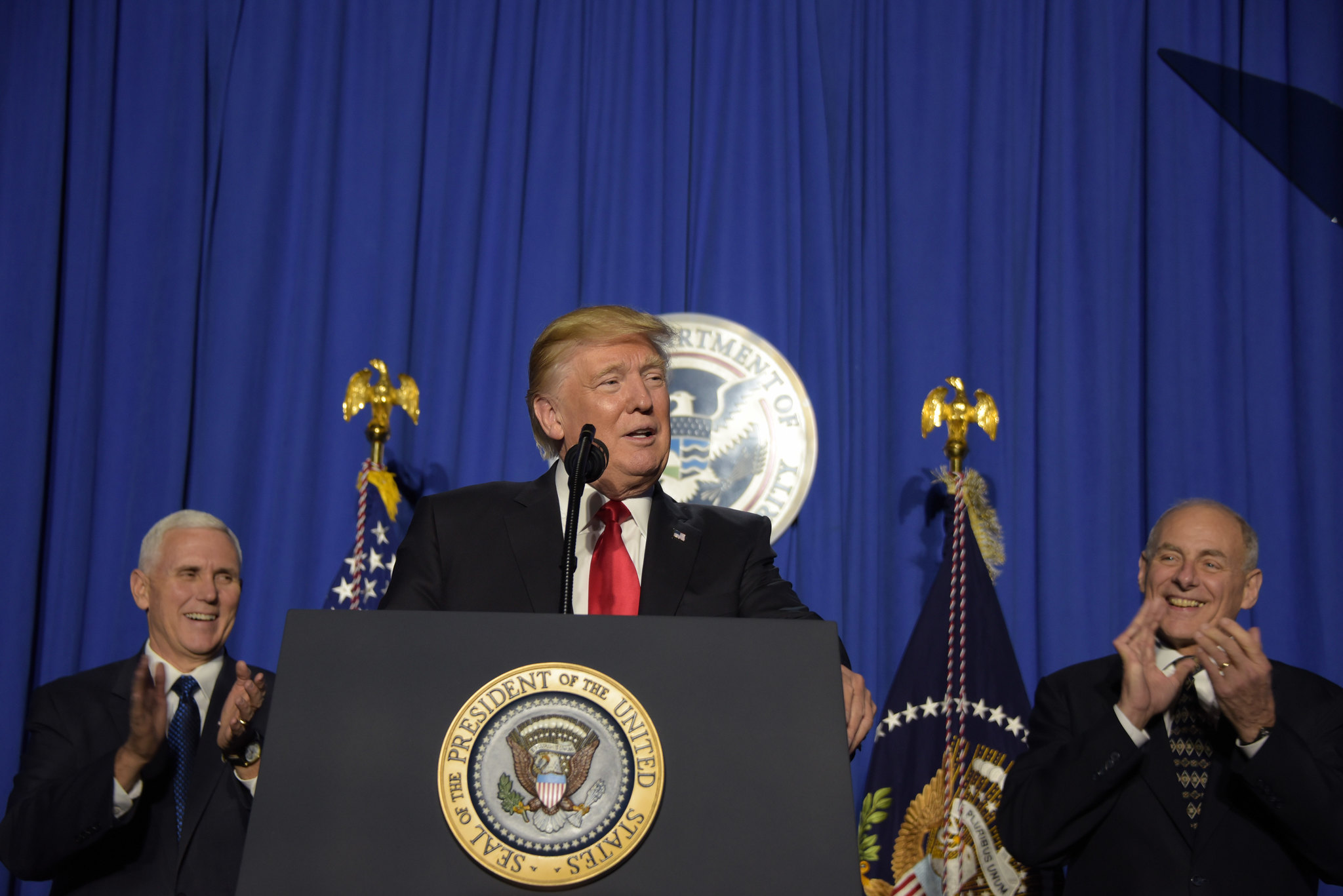Where’s the Venue: The Risks of Charging the Mar-a-Lago Case in D.C.
Should the Justice Department seek charges in the Mar-a-Lago case, the U.S. government may be precluded from bringing the case in D.C.

Published by The Lawfare Institute
in Cooperation With

Last week, CNN reported that the Justice Department put advisers to former President Donald Trump (FPOTUS) before a grand jury sitting in Washington, D.C., in the case involving classified and other documents stored at Mar-a-Lago, heightening the likelihood that charges are forthcoming. This prospect raises a critical open question: Where would the Justice Department bring charges? It is not a straightforward question—the group within the department leading the case, the Counterintelligence and Export Control Section, could direct the case to multiple districts.
There are many reasons the Justice Department would prefer to bring charges in D.C., instead of the Southern District of Florida, where the Mar-a-Lago resort is located and much of the alleged unlawful conduct unmistakably occurred. The judges in D.C. are more familiar with cases involving classified information and the Espionage Act, the lead attorneys and agents reside in D.C., the grand jury sits in D.C., and the jury pool in D.C. appears to be less deferential toward FPOTUS. However, these pragmatic considerations could be irrelevant if there is not sufficient evidence to establish proper venue in D.C. for some of the charges, which could result in those charges being dismissed. In other words, there may be legal risks to bringing the Mar-a-Lago case in D.C.
What Do We Know?
Although allegations are emerging at a rapid pace, the core known facts remain largely unchanged. The National Archives and Records Administration (NARA) sought to secure presidential records from FPOTUS before he left the White House. In early 2021, NARA engaged in extensive discussions with the former president's attorneys to return at least two dozen boxes that had been located in the White House residence. FPOTUS ultimately transmitted 15 boxes of records to NARA in January 2022, which appeared to contain 184 classified documents. After a referral from NARA on Feb. 9, the Justice Department opened a criminal investigation. On April 29, the Justice Department sent a letter to the former president's attorneys seeking immediate access to the documents. On May 11, the Justice Department issued a subpoena to FPOTUS for any records in his possession with classified markings. The following month, at a meeting at Mar-a-Lago, the former president's attorneys turned over 38 additional classified documents in response to the subpoena and provided the Justice Department with a signed certification letter stating that a “diligent search” was completed and that no documents with classified markings remained. Two months later, the Justice Department executed a search warrant at Mar-a-Lago to recover presidential and classified records that had not been returned.
The search warrant authorized the seizure of all documents and records constituting evidence of violations of three federal statutes: 18 U.S.C. §§ 793 (retention of national defense information), 1519 (obstruction), and 2071 (concealing or removing government records). The FBI seized more than 13,000 documents totaling approximately 22,000 pages, including more than 100 documents bearing classification markings, with some indicating the highest levels of classification and extremely limited distribution.
What Is Venue?
Criminal defendants have a constitutional right to be tried in the location where the crime was committed, known as venue. Criminal statutes often provide direction on where the case can be charged. Absent a statutory provision, venue is determined by a two-step process: (i) identifying the essential conduct elements of the offense and (ii) ascertaining the location of that conduct. If essential criminal conduct takes place in more than one district, the government may prosecute those offenses “in any district in which such offense was begun, continued, or completed” (18 U.S.C. § 3237(a)).
Is There Venue in D.C.?
Determining where a crime was committed can be nuanced, as determining what is “essential” conduct is often open to interpretation. Since none of the three alleged offenses presented in the search warrant contain an express venue provision, determining where the Justice Department can bring charges requires an analysis of each statute.
Retaining National Defense Information (18 U.S.C. § 793(e))
The first statute listed in the warrant, 18 U.S.C. § 793(e), prohibits willfully retaining national defense information without authorization. Classified information historically has been a proxy for “national defense information,” but technically the latter is broader, encompassing “closely held” information that pertains to the military or national preparedness, the disclosure of which would damage national security. The elements of the statute are that (i) the defendant had unauthorized possession of the documents; (ii) the documents related to the “national defense”; (iii) the defendant had reason to believe the documents could be used to the injury of the United States; and (iv) the defendant willfully retained the documents and refused to deliver them to a government official who was entitled to receive them.
Analyzing a potential prosecution requires wading into the uncharted territory of applying these elements to a former president whose prior authority and control over classified documents were near limitless. Here, “unauthorized possession” concerns only the period when FPOTUS was no longer president. As president, he could have possessed any documents—including classified documents—wherever he wanted, even outside of the requisite secure facility to view classified information.
FPOTUS argued in his recent Supreme Court filing that he was still president when the boxes that contained the documents marked classified were moved out of the White House to his residence at Mar-a-Lago. If that is true, he would not have had unauthorized possession of the documents in D.C. However, the former president's filing merely cites a New York Times article to support the claim, as opposed to introducing evidence. And he has conspicuously omitted this assertion in any other proceedings. The timing of the transfer of the documents out of the White House thus remains an open question and is likely a focus of the Justice Department’s investigation. Prior Section 793 cases are of limited value for venue, since, in every other retention case, “unauthorized” possession occurred the moment a person left a secure facility with classified information—circumstances not applicable here if FPOTUS moved the documents to Mar-a-Lago while he was still president.
Similarly, with respect to the retention of the documents with classification markings, if the documents arrived in Florida before President Biden was inaugurated, it would appear FPOTUS retained the documents unlawfully only once they were already in Florida.
Depending on these currently unconfirmed facts regarding the location of the documents marked classified, the Justice Department thus appears to have hurdles to establishing venue in D.C. One potential argument the Justice Department could make—by providing evidence of planning and willfulness in the removal of classified documents—is that the offense began in D.C. For example, if FPOTUS made arrangements to move classified documents to Mar-a-Lago while he was still in D.C. and prior to the end of his administration, then the criminal conduct arguably began in D.C. Public sources have reported that individuals witnessed FPOTUS personally sort through the documents at the White House prior to President Biden’s inauguration and he was warned by his former White House lawyer that it was unlawful to retain classified documents. Basing venue on these facts, however, would not be without risk. Multiple appellate courts, notably the Second, Fourth, Fifth, and Sixth Circuits, have held that preparatory acts alone cannot support venue, and the D.C. Circuit has been silent on the sufficiency of preparatory acts for purposes of venue.
Additionally, the Justice Department could search for evidence connecting the former president's refusal to deliver the documents to D.C. There is some precedent establishing that if the crime is a failure to do a required act (for example, deliver documents), “the place fixed for its performance determines” the location of the crime (for example, if the documents were required to be turned over to a government official in D.C.). Such cases, however, are not directly on point and have never been applied to a retention charge. If the former president's attorneys or representatives were in D.C. when they denied that documents were located at Mar-a-Lago, if they communicated in D.C. a refusal to return all of the documents, or if they certified in D.C. that all documents had been provided, then the Justice Department could have another avenue to venue in D.C. It is also worth noting that if FPOTUS were to be charged with conspiracy to violate Section 793(e)—which the Justice Department did not allege in the search warrant—the relevant acts germane to venue would broaden.
Accordingly, while there are still too many unknowns to maintain there is no venue in D.C. for the retention charge, there currently is risk to moving forward with a prosecution on this charge in D.C.
Obstruction (18 U.S.C. § 1519)
For obstruction of justice, the government must prove that (i) the defendant knowingly altered, destroyed, mutilated, concealed, covered up, or falsified documents; (ii) the defendant acted with the intent to impede, obstruct, or influence the investigation or proper administration of any matter; and (iii) the matter was within the jurisdiction of any department or agency of the United States.
Courts have provided little to no guidance on how venue is to be applied to this particular obstruction provision. Generally, for other obstruction statutes, venue is appropriate where the impeded proceeding at issue is pending. Here, that would be D.C., where the grand jury that issued the subpoena sits. Such is the rule in the Eleventh Circuit, which includes the Southern District of Florida. Yet the D.C. Circuit has adopted a contrary view, suggesting that venue often lies only in a district in which the defendant committed unlawful acts, not in a district where only the effects of the crime occur.
The clearest evidence of concealment in this case—the obstruction itself—occurred in the Southern District of Florida. For example, the former president's attorneys’ false certification that “a diligent search” had been completed and no documents with classified markings remained at Mar-a-Lago was provided to the Justice Department in the Southern District of Florida. If those attorneys also made inaccurate representations to the government regarding the documents while in D.C., these could again serve as a basis for venue in D.C. Without such concealment in D.C., and with unfavorable precedent from the D.C. Circuit, there is also some risk in bringing this charge in D.C.
Concealing or Removing Government Records (18 U.S.C. § 2071)
The last statute, Section 2071, appears to be the safest to bring in D.C., from a venue perspective. That is in part because its purpose was to prevent any conduct that deprives the U.S. government of the use of its documents, whether by concealment, destruction, or removal.
The essential elements of this statute are that (i) the defendant had custody of any document; (ii) that was filed or deposited with any public officer of the United States; (iii) the defendant acted willfully and unlawfully; (iv) and the defendant concealed, removed, mutilated, obliterated, falsified, or destroyed the document. Courts have gone so far as to suggest that this offense is committed by taking the records from any place, wherever they might be found, if done with the requisite intent.
Here, government records clearly were removed from the White House in D.C. And FPOTUS, while at the White House, designated officials to provide presidential records during his presidency to NARA. In so designating officials, FPOTUS appears to have been aware that presidential records needed to be provided to NARA when his term ended. Various news sources report that FPOTUS personally sorted through the documents while he was still president and in D.C. Furthermore, both the New York Times and the Washington Post report that there were conversations among FPOTUS administration officials, prior to FPOTUS leaving the White House, regarding the need to return the documents. Venue by means of concealment could also be triggered if one of the former president's attorneys or representatives was located in D.C. and falsely represented to NARA that all presidential records were turned over.
What If There Is No Venue in D.C.?
Thus, there is risk that venue in D.C. for some of the contemplated charges would not be proper. While the department would not be limited to the three statutes listed in the warrant, they are the current criminal guideposts in the case. And arguably the most serious charge—the retention of national defense information—presents a real venue challenge.
The risks to the case, should the Justice Department be unable to establish proper venue, are potentially crippling. If charges are brought against him in D.C., FPOTUS could move to dismiss for improper venue before trial. A judge, in turn, could dismiss any charges lacking venue in D.C., forcing the Justice Department to bring the remaining charges in D.C. or move the entire case to Florida. If the case is not dismissed, or FPOTUS does not file a preemptive motion in advance of trial, he could seek acquittal from the jury based on a lack of venue. An acquittal, even on the grounds of venue, would subsequently bar prosecution for those offenses. And even if the jury convicts, FPOTUS could then challenge a conviction for lack of venue based on the argument that no acts necessary to establish the crime occurred in D.C.
The unresolved nature of the venue inquiry under these statutes would leave a judge—or jury—room to reject venue in D.C. for some of the offenses. There are numerous examples where courts have dismissed charges based on failure to establish venue in circumstances where facts appeared to strongly support it. For example, in a recent espionage case in the Eastern District of Virginia, a judge overturned a guilty verdict on two espionage charges, ruling that the department had failed to establish venue. In that case, the judge found that although the defendant lived in Virginia, there was no evidence he was in Virginia when he actually transmitted national defense information via a mobile device. Yet the Justice Department provided compelling evidence establishing the defendant’s presence in Virginia, including his trip to a mail station to send the documents at issue.
We still do not know many critical facts that impact the venue determination. And it is possible the Justice Department is considering other charges and could establish venue in districts beyond D.C. or Florida. But based on what we know, for the charges we know the Justice Department is considering, there is risk in bringing all three charges in D.C. because of venue—risks not present in the Southern District of Florida where venue appears strong. That could be part of the reason we have not seen any real involvement in the investigation from the U.S. Attorney’s Office for the District of Columbia, even though a grand jury is operating in D.C.






